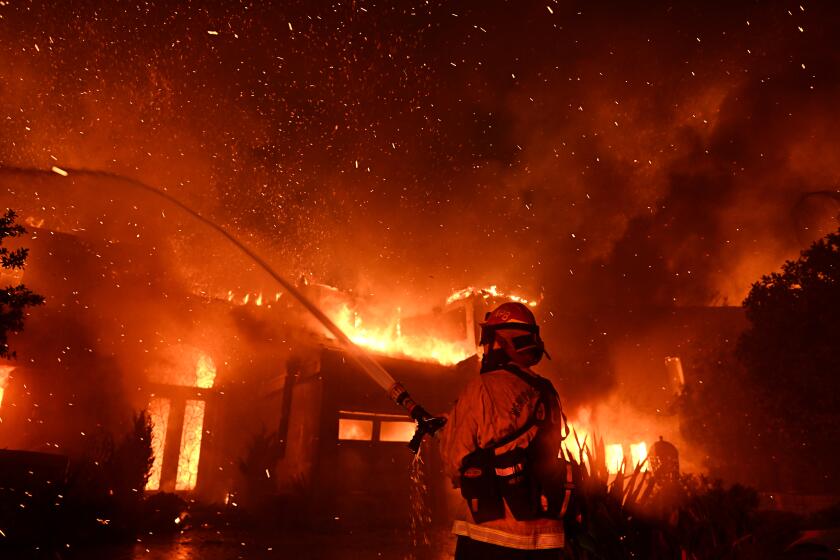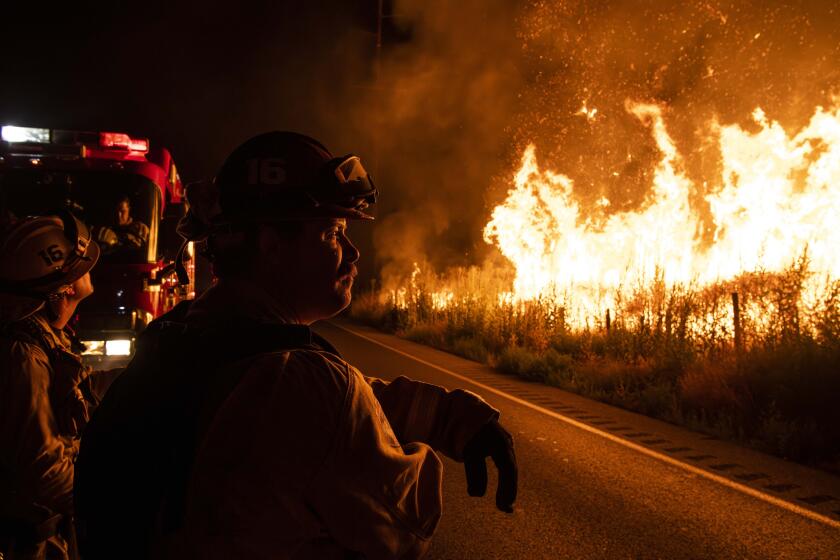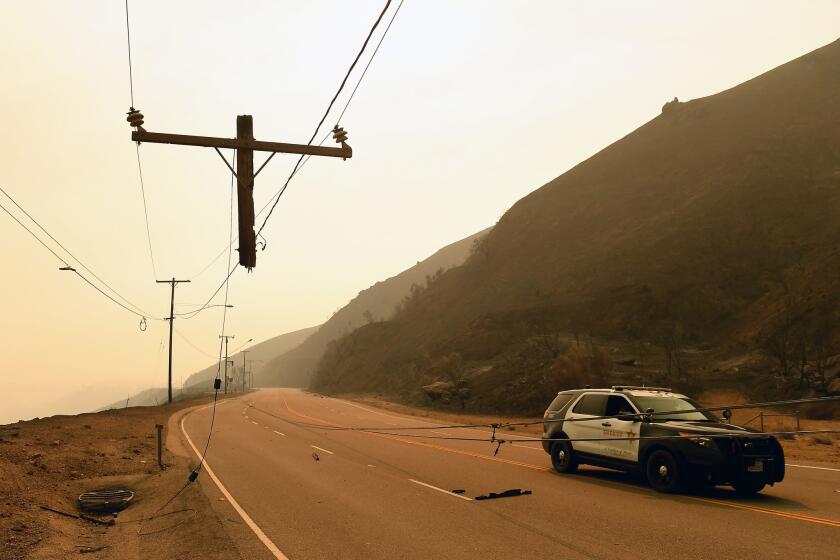Orange County sues Southern California Edison, T-Mobile over Coastal and Silverado fires

- Share via
Orange County filed two lawsuits Monday against Southern California Edison alleging the utility acted negligently in maintaining and operating its equipment, which resulted in the ignition of two wildfires that burned thousands of acres and forced massive evacuations.
One suit, which names Edison and T-Mobile, alleges the Silverado fire ignited in October 2020 after one of T-Mobile’s lashing wires fell onto one of Edison’s overhead primary conductors.
The second suit, filed solely against Edison, alleges the Coastal fire — which destroyed more than 20 homes in Laguna Niguel in May 2022 — was sparked by an electrical failure on one of the utility’s poles that supported a 12,000-volt distribution line. The failure caused “an arc that ignited susceptible ground vegetation,” according to the lawsuit.
Just three hours after a small fire was reported in Aliso Woods Canyon, at least a dozen homes were ablaze.
Court records don’t show how much money the county is seeking. But it is asking for damages that include the reimbursement of staff labor and wages and money for damage to public infrastructure and restoration of land, along with costs for law enforcement, fire suppression efforts and money spent to run emergency operations centers.
“SCE and T-Mobile both had a duty to properly construct and maintain their electrical and telecommunications infrastructure and surrounding vegetation. SCE and T-Mobile violated these duties by knowingly operating aging and improperly maintained infrastructure,” the lawsuit states, adding that had the companies “acted responsibly the Silverado fire could have been prevented.”
Representatives for T-Mobile did not immediately respond to an email seeking comment. Southern California Edison spokesperson Diane Castro said the utility cooperated with the Orange County Fire Authority in its investigations into both fires.
“Our thoughts are with the communities who were impacted by the Silverado and Coastal fires,” Castro said. “It wouldn’t be appropriate for us to comment outside of the legal process on the specifics of ongoing legal action.”
Recent storms have dampened conditions but have also spurred new vegetation that could act as fuel for fires. Also, strong fall winds have yet to arrive.
The Silverado fire burned for 12 days in 2020 in an unincorporated area near Irvine, charring 12,466 acres and forcing tens of thousands of residents from surrounding communities to evacuate.
One lawsuit alleges that after the fire started about 6:45 a.m. Oct. 26 amid strong Santa Ana winds, Edison was slow to respond. The utility did not shut off power to the line in the fire zone until 36 minutes after the blaze ignited, “despite the circuit experiencing elevated amperage readings,” the suit states.
The Coastal fire started around 2:40 p.m. May 11, 2022, near a wastewater treatment plant and quickly burned uphill. It tore through stately homes on Coronado Pointe as residents fled.
The land where the blaze broke out is considered by the California Department of Forestry and Fire Protection to be a “very high fire hazard severity zone,” the lawsuit states. This classification, the suit alleges, made it clear that Edison should use heightened safety measures in the area.
“We demand that the utilities responsible for the destruction of county assets, increased expenses, reduced revenues, and environmental damages, reimburse the County,” Supervisor Katrina Foley said in a prepared statement. “In 2022, the California State Auditor found that the utilities are not doing enough to reduce wildfire threats throughout the State of California. We have a duty to protect our taxpayers and County assets.”
The agreement relates to the Thomas, Woolsey, Rye, Meyers and Liberty fires, which collectively burned through more than 380,000 acres in 2017 and 2018.
This is not the first time Edison has faced scrutiny over its role in wildfires.
Last May, a group of homeowners whose properties were destroyed in the Coastal fire filed a lawsuit claiming the utility’s equipment was to blame for the blaze. That lawsuit is ongoing, according to court records.
Last October, the state forestry department sued Edison and T-Mobile, also alleging equipment failures caused the Silverado fire. That suit accused Edison and T-Mobile of failing to properly design, install and maintain equipment, alleging the issues caused arcing amid strong Santa Ana winds and sent sparks into the dry brush. That lawsuit is also ongoing, court records show.
All the latest on Orange County from Orange County.
Get our free TimesOC newsletter.
You may occasionally receive promotional content from the Daily Pilot.







